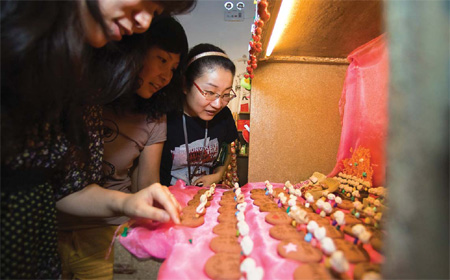 |
|
Customers walk from box to box at Fengguo Space, finding unique and creative gifts, arts and crafts. Fengguo Space gives independent Chinese artists a chance to showcase their products. [Jonah M. Kessel] |
When government officer Wang Luoyuan, 39, wants to furnish his house, he goes to IKEA. When he buys a pair of earrings for his wife, Tiffany comes to his mind. If his kid needs a schoolbag, he goes to adidas.
However, 27-year-old bank clerk Luo Ruixue is different. She prefers Fengguo Space, which sells products designed by independent designers from China, to international labels.
Luo shows off her skirt bought at Fengguo Space, a 100 percent cotton, black and polka-dot creation, with Chinese characters.
"If I buy a Marc Jacobs skirt, it will cost me 1,000 yuan ($146), and someone else might have the same dress. But I got this one, designed by a college student, for just 145 yuan," Luo says, adding brands are out, independent designs are in.
Fengguo Space, a branch of Fengguo Box, in Zhongguancun, Beijing's Silicon Valley, is smartly decorated. Each shelf is divided into a lattice and designers who want to sell their trinkets rent boxes to showcase their wares. It costs from 30 to 400 yuan per month to rent a box, depending on the size.
At Fengguo Space, there are many classic toys such as cars and robots that have big price tags. Another range of products called Bricks features key rings made of Lego bricks. Other trinkets such as bags, cigarette boxes and stuffed animals are also on display.
Goods from local designers such as "Princess" Zhao Xi and Gao Yuan are on offer, as well as those by designers from European countries.
Xu Jianmeng, marketing manager of Box Community, says they are going to introduce independent foreign furniture names to Chinese consumers, including Microworks, Athmos, and Suck UK.
"Young Chinese people hate to be the same as each other, be it food, clothing or way of life. They don't want to have an identical IKEA style. That is why indie designs are so popular today," says Xu.
Zhao Xi, a part-time indie designer, works at an advertising company, which is the usual humdrum office job, but realizes her dream by creating items for indie stores, something she started at university.
"Before 2007, we went to some i-Mart stores to sell the things we made. Now indie designs are getting more attention. We have box shops, we have regular i-Marts, and some of the designers are beginning to make money," says Zhao, wearing a colorful necklace she made for herself.
Fengguo Box held the first i-Mart in Beijing in 2007. Though there were only 26 stands, it made more than 500,000 yuan ($73,000) in two days.
Now there are i-Marts every two months. Five months after Fengguo Box opened its first store in 2007, it had a turnover of 1.7 million yuan.
The government also wants to promote local design. Beijing Original Design Promotion Association (BODA), founded late last year, is an organization under Beijing Sci-Tech Association.
BODA recently held the Original Circle exhibition at Sanlitun on Aug 18, showcasing some 30 designers' works.
Ma Jia, president of BODA, says Chinese indie designers need more platforms to gain recognition. He says indie designers, the media, government, consumers and shops should work together to promote it.
Many indie designers who attended the exhibition have become well-known at home and abroad, including Hong Kong designer Alan Yip and design corporation Zhuozhan. Some of Beijing-based company Lococo's works won the Red Dot Award, considered the Oscars of the design industry.
(China Daily August 28, 2009)